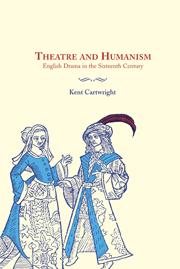Book contents
- Frontmatter
- Contents
- Acknowledgments
- Introduction
- 1 The humanism of acting: John Heywood's The Foure PP
- 2 Wit and Science and the dramaturgy of learning
- 3 Playing against type: Gammer Gurton's Needle
- 4 Time, tyranny, and suspense in political drama of the 1560s
- 5 Humanism and the dramatizing of women
- 6 The confusions of Gallathea: John Lyly as popular dramatist
- 7 Bearing witness to Tamburlaine, Part 1
- 8 Robert Green's Friar Bacon and Friar Bungay: the commonwealth of the present moment
- Afterword
- Notes
- Index
Introduction
Published online by Cambridge University Press: 22 September 2009
- Frontmatter
- Contents
- Acknowledgments
- Introduction
- 1 The humanism of acting: John Heywood's The Foure PP
- 2 Wit and Science and the dramaturgy of learning
- 3 Playing against type: Gammer Gurton's Needle
- 4 Time, tyranny, and suspense in political drama of the 1560s
- 5 Humanism and the dramatizing of women
- 6 The confusions of Gallathea: John Lyly as popular dramatist
- 7 Bearing witness to Tamburlaine, Part 1
- 8 Robert Green's Friar Bacon and Friar Bungay: the commonwealth of the present moment
- Afterword
- Notes
- Index
Summary
English drama at the beginning of the sixteenth century registers as allegorical, didactic, and moralistic, yet by the end of the century theatre would be censured as emotional, fantasy-arousing, and even immoral. How could such a change occur? How does it happen that drama, which enters the century as a vehicle of spiritual enlightenment, becomes, by the 1590s, itself an object of emotion? To address such questions requires exploring the ways that Tudor drama engages feelings and sensibilities, the ways that it creates the Renaissance experience of being “moved”; it requires exploring, that is, dramaturgy and theatrical effect. Such an inquiry will suggest that influential theories of early Renaissance theatre – particularly the theory that Elizabethan plays are viewed best through the tradition of morality drama – need reconsidering to explain theatre's affective power. The excitement of the Tudor stage derives partly from a humanist dramaturgy that embroils feelings and emotions in the creation of meaning.
An overarching issue continues to be troubling: how to account for England's high tide of drama in the sixteenth century. Prior to the explosion of commercial theatre in Elizabeth's reign, plays had already taken firm hold. In the Tudor humanist educational program at grammar schools and universities, for example, students studied and performed plays to a degree difficult to explain.
- Type
- Chapter
- Information
- Theatre and HumanismEnglish Drama in the Sixteenth Century, pp. 1 - 24Publisher: Cambridge University PressPrint publication year: 1999



